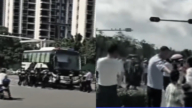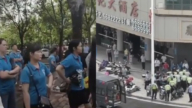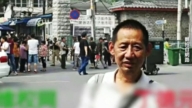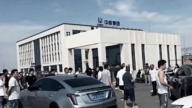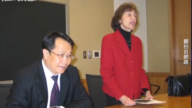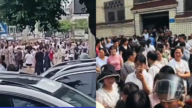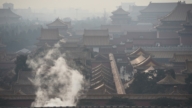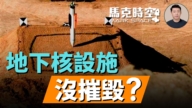【新唐人2012年11月2日讯】宁波市群众抗议化工厂扩建项目取得初步胜利。这已经不是中共当局第一次向示威民众让步。过去几年间,北方的大连和南方的厦门都曾因为抗议示威,而停建了原来所计划的化工厂项目。宁波、大连和厦门都是中国经济发展比较迅速的城市。外媒评论说,中产阶级造反让中共惧怕。国内学者指出,一个社会的文明进步,中产阶级是一个中坚力量。
ht
《美联社》评论说,当局对待沿海城市的抗议民众的手法似乎更为理性与温和。但在对待帮助中共起家的乡村底层民众和工人阶级的抗议示威,却通常采用严厉的镇压手段。中共当局更惧怕中产阶级造反。广州画家何国泉认为,一个社会的文明进步,中产阶级是一个中坚力量。发达地区民众的抗议借助现代化通讯工具,把消息很快传给外界,给当局施加压力。
广州画家 何国泉:“因为他们现在也有多媒体。有照相机,摄像机,还有手机,还有推特,互联网,这对政府来讲,他也不能搞的太过分。他有资料,到时可以用图像来说明问题。那么作为地方政府,他也要考虑他的影响。”
《美联社》评论说,只要由中产阶级为主的抗议示威所提的要求有限,并且没有提出具体的政治口号,当局通常会做出让步。由过去10年经济腾飞所形成的中国中产阶层,只是希望能有一个更好的政府,并不期望改朝换代。他们通常最为关心的问题是健康、教育和房价,并且经常反感北京所推行的一切为经济增长让路的政策。
何国泉表示,目前来讲,民众维权声势比较大的,爆发力比较强的,基本上都是因为和自己切身的生存利益发生矛盾。
何国泉:“老百姓现在对政府也不是很信任。加上他们搞的开发污染,老百姓也知道这是关系到他们生命,子孙万代生态的大事。所以现在人肯定要出来抗争。而且这种东西也有悲情色彩,也容易让很多人,哪怕不是宁波的人也同情他们,支持他们。所以政府他也要考虑。”
中共政府对沿海发达城市群众抗议的部分退让,并不意味着共产党变得更加温情,软硬兼施,一切都是出于维稳的考虑。
何国泉:“他们现在做这些事情,有时候他会采取很多种。有一种我们能看到的。还有一种是一般人看不到的。只不过现在这种局面,维稳嘛,一旦到了一定气势的时候,他们就马上会妥协。如果你没有到那种气势的时候,他会很严厉的把你压下去。这种事情实际上在中国非常多。污染是一方面,还有楼盘啊,侵占别人用地的,压得多了。很多都没有(报导)出来。”
与宁波群众抗争事件相同的,中国已有多个沿海城市发生类似事件,包括福建厦门、山东的青岛、辽宁的大连等等。中国有14个沿海开放城市,这些城市都在发展重化工业。
美国媒体《每日野兽》报导说,环境担忧让普通中国人克服了对抗议惧怕的心理。在一个人们无法获知工业项目有关信息,和对影响他们生活的决定没有发言权的社会,群体抗议是唯一的选择。
采访编辑/秦雪 后制/肖颜
****************************
Regime Fears “Middle-Class Rebellion” in China?
The mass protest against the expansion of a chemical plant
has achieved initial victory in Ningbo, Zhejiang Province.
This was not the first time for the Chinese Communist Party
(CCP) to yield to Chinese protesters.
In the last few years in Dalian and Xiamen, citizen protests
forced authorities to halt planned chemical plant projects.
Cities of Ningbo, Dalian and Xiamen
are “better-off” cities in China.
Foreign media reviewed that “the authoritarian government
is scared of middle-class rebellion.”
Scholars believe that the middle class becoming
a powerful force indicates that society is making a progress.
The Associated Press said, “The treatment protesters there
received has been gentler than the beatings and large-scale arrests often given to rowdy rural and working-class.”
“The authoritarian government
is scared of middle-class rebellion.”
Guangzhou’ painter He Guoquan claims, society progresses
when the middle class evolves into a powerful force.
In the developed regions, modern communication facilities
can help spread the protests’ news to the public.
This will naturally put the authorities under pressure,
says He Guoquan.
He Guoquan: “Multimedia is available now, like cameras,
video cameras, mobile phones, Twitter and internet.
This makes the authorities dare not go too far.
All on-site pictures can bear witness to authorities’ actions.
The local authorities do have to consider the aftermath."
The AP stated, “The authoritarian government will give in if
the demonstrators’ aims are limited and not openly political.”
“China’s nascent middle class, the product of the past
decade’s economic boom, is looking for better government, not a different one.”
“They’re especially concerned about issues like health,
education and property values and often resist the growth-at-all-costs model Beijing has pushed.”
He Guoquan remarks that currently, those large and strong
mass protests are usually ones threatening people’s survival.
He Guoquan: “Now regular people have little confidence
in this government.
People know that pollution caused by economic growth
directly threatens their lives and those of future generations.
So they stood up to resist it.
The issue has gained support from citizens in other regions.
I think the government has to weigh up the issue.”
The CCP’s partial concession was not made
for adopting the carrot and stick policy.
It actually met the needs
of its stability preservation.
He Guoquan: “They have various tactics
to deal with a situation.
If the mass protests prove to be overwhelming,
the authorities will quickly yield.
If not, the authorities will enforce
a very harsh crackdown.
Protests against pollution, the real estate developers,
and land grabbing by officials is common in China.
Numerous resistances have been
repressed and muzzled."
Similar mass protests to Ningbo’s have been staged
in other coastal cities including Xiamen, Qingdao, Dalian.
Fourteen coastal cities in China are all economically driven
by heavy-chemical industries.
US-based online media the Daily Beast wrote:
“Environmental concerns have a way of overcoming
the skittishness that ordinary Chinese generally feels about protesting.”
“People have little access to information about industrial
projects and are completely excluded from the decisions that affect their lives, mass protests are the only option.”


